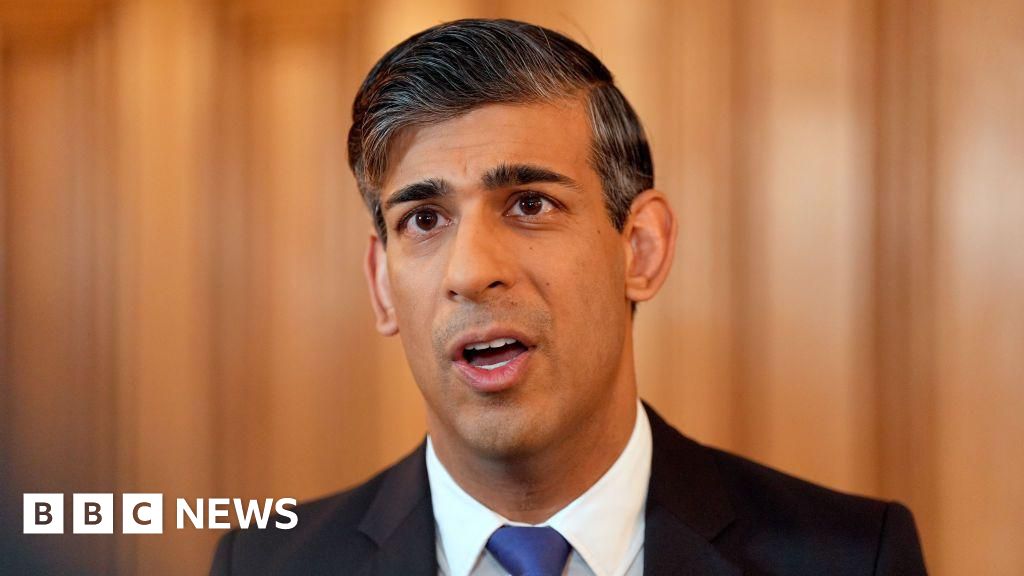The UK's statistics watchdog has criticised the prime minister over claims around the tax burden families could face if Labour wins the general electi
The UK’s statistics watchdog has criticised the prime minister over claims around the tax burden families could face if Labour wins the general election.
The Office for Statistics Regulation (OSR) said anyone who heard Rishi Sunak say that Labour tax rises would amount to just over £2,000 per working household would have no way of knowing that was a sum totalled over four years.
It was referred to several times by the prime minister during the first live TV debate between himself and Labour leader Sir Keir Starmer on Tuesday.
The BBC has approached the Conservative party for comment.
In Tuesday’s debate Mr Sunak also claimed that “independent Treasury officials” had costed the figure.
On this point the OSR, which is the independent regulatory arm of the UK Statistics Authority, referred to a letter from the Treasury’s top civil servant, which said that the Conservative party document included some policy costings “derived from other sources or produced by other organisations [and] should not be presented as having been produced by the Civil Service”.
BBC Verify also analysed the claims and concluded that they risked misleading people.
After the programme was aired, Sir Keir hit out, accusing the prime minister of “deliberately” lying about Labour’s tax plans.
He insisted Labour would not bring in tax rises for working people.
Like the Conservatives, Labour has pledged not to increase the rate of income tax, National Insurance and VAT if it wins the election.
The OSR has been investigating the Conservatives’ £2,000 claim.
It pointed out that the party had published a document explaining which policies it had included when coming up with the number, how it interpreted the policies and how Treasury officials had costed some but not all of them.
But it said: “Without reading the full Conservative Party costing document, someone hearing the claim would have no way of knowing that this is an estimate summed together over four years. We warned against this practice a few days ago, following its use in presenting prospective future increases in defence spending.”
Ahead of the first TV debate in the run-up to polling day on 4 July, Sir Robert Chote, chair of the UK Statistics Authority, wrote to the main political parties to warn them about “ensuring the appropriate and transparent use of statistics”.
Sir Robert said: “The work of the UK Statistics Authority is underpinned by the conviction that official statistics should serve the public good.
“This means that when statistics and quantitative claims are used in public debate, they should enhance understanding of the topics being debated and not be used in a way that has the potential to mislead.”
The OSR also recently closed an investigation into a previous claim that the UK economy was “going gangbusters”, which was later referred to by officials including Rishi Sunak.
The investigation looked at whether the phrase from a top Office for National Statistics (ONS) official was taken out of context.
Mr Sunak said in an interview with the BBC’s Today programme in May: “The facts are the facts. You had, I think, the person from the Office for National Statistics talking about the economic growth that the country produced in the first quarter of the year.
“He said what he said about that and I think he used the term ‘gangbusters’, so I will leave it at that.”
Mr Sunak was quoting Grant Fitzner, the chief economist at the ONS.
Mr Fitzner had told journalists earlier in May: “To paraphrase former Australian Prime Minister Paul Keating, you could say the economy is going gangbusters.”
However, on Thursday the ONS said that it immediately clarified the comment at the time as a “passing reference” to the former Australian PM’s remarks.
A spokesperson for the ONS said: “It was certainly not intended as a comment about the overall state of the economy and when the comment was made it was immediately clarified to those present that this was not a word that the ONS would use to describe the first quarter’s growth.
“We also put the comment in context for journalists who followed up afterwards.”
Mr Fitzner’s comments came after official figures showed the economy had emerged from recession.
The ONS estimated that gross domestic product (GDP) grew by 0.6% between January and March, meaning the economy recovered from the recession recorded late last year.
The state of the UK economy is expected to be one of the key campaigning points around the general election, with leaders of various parties setting out their plans on how they would improve growth and productivity.
www.bbc.com
